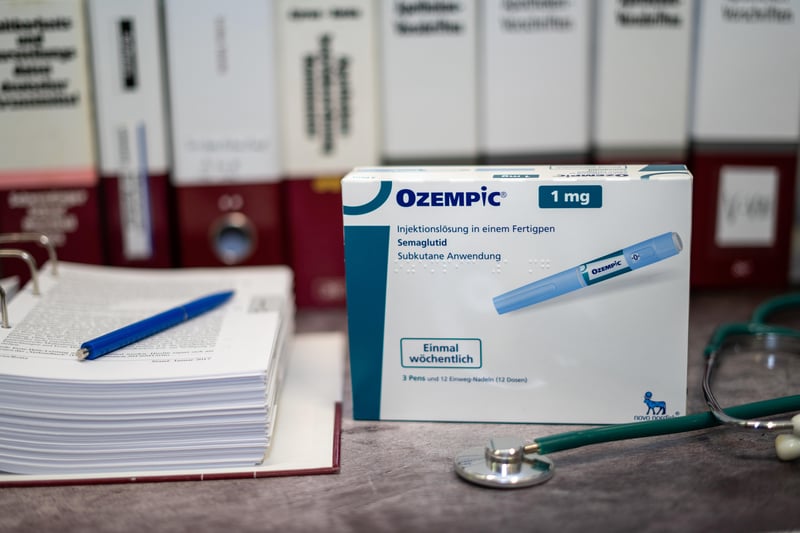Get Healthy!

- Dennis Thompson
- Posted December 21, 2022
Diabetes Med Ozempic in Short Supply as Americans Use It for Weight Loss
Elon Musk swears by the weight-loss drug Wegovy, and Kim Kardashian is rumored to have used it to shed 16 pounds in three weeks to squeeze into a vintage gown once worn by Marylin Monroe.
But the intense public demand for Wegovy has triggered a shortage of the diabetes version of the injectable medication, known as Ozempic. That's leaving patients with the blood sugar disease in a real bind.
Made by Novo Nordisk, semaglutide (Ozempic) has been on the market since 2017 to help manage type 2 diabetes. But in June 2021, the U.S. Food and Drug Administration approved semaglutide to treat weight loss under the brand name Wegovy.
Ever since Wegovy arrived on the market, Novo Nordisk has struggled to meet demand, experts said.
Unfortunately, people who want to drop pounds and can't find Wegovy are getting doctors to write them off-label prescriptions for Ozempic, eating into supplies of a drug that's vital in the treatment of diabetes.
"We've heard reports of people really struggling to fill their prescriptions,"said Dr. Robert Gabbay, chief science and medical officer for the American Diabetes Association. "I still see patients at the Joslin Diabetes Center, and I can tell you that some of my patients have said, oh, yeah, you know, I had to go to lots of different pharmacies to finally find it. It's been a problem."
Semaglutide is a synthetic form of a naturally occurring gut hormone, explained Dr. Caroline Apovian, past president of the Obesity Society and an adjunct professor at Boston University's School of Medicine.
The drug helps the body make more insulin, which lowers blood sugar levels for people with diabetes, Gabbay and Apovian said.
But in early trials, the drug also showed potential as a weight-loss medication.
Semaglutide slows down the emptying of the stomach, so people feel full faster and tend to eat less, Gabbay said.
There's also some evidence that the drug works on the brain to lower appetite, Gabbay and Apovian said.
"Wegovy has been shown to promote up to 15% to 20% weight loss, so it's pretty significant,"Apovian said. "It created quite a stir because, until recently, it was the drug that had the most efficacy for weight loss."
Both Wegovy and Ozempic are now listed as in short supply on the FDA's drug shortage website.
There are other drugs in the same class that diabetics can use, but switching is not a simple proposition, Gabbay said.
"Because it's a long-acting drug, you take it once a week to build up the ... levels in the body. To be effective, you've got to be on it for a while. If you were to switch, you sort of have to start building up again,"Gabbay said. "It could take a couple, three months to get to where they were, in which case they've lost a lot of time and effectiveness."
The drug's main side effect is nausea and vomiting, particularly after the patient has eaten too much, Gabbay and Apovian said.
To avoid this side effect, people start both Wegovy and Ozempic at low doses, which are gradually increased, the experts said.
For either weight loss or obesity, patients receive one injection of semaglutide once a week.
Novo Nordisk has promised that its supply problems should be sorted out by January, with all doses of Wegovy available at pharmacies around the United States, Apovian said.
In a statement, Novo Nordisk said that 1 and 2 milligram (mg) doses of Ozempic should be available, but intermittent supply disruptions have affected the availability of 0.25 mg and 0.5 mg Ozempic "pens."
Those shortages are "due to the combination of incredible demand coupled with overall global supply constraints,"the statement said. "While product continues to be manufactured and shipped, patients in some areas of the country will experience delays with these doses."
Gabbay said that "there have been some reports that things are getting better, but I don't think we're there yet. We're monitoring the situation and hoping that people will have better access to this medication than others."
The dosage of semaglutide required to treat obesity is higher than that for diabetes, Apovian noted; 2.4 mg for Wegovy versus a maximum 2 mg for Ozempic.
Insurance coverage further complicates the matter.
Ozempic is generally covered by insurers as a diabetes medication, Apovian said, but Medicaid, Medicare and many private insurers don't cover anti-obesity drugs.
"For obesity, about 30% of patients who have private insurance get Wegovy coverage right now,"she noted.
The rest have to pay out of pocket for the drug. Wegovy's list price is $1,349 for a month's supply, according to Novo Nordisk's website, while Ozempic can cost nearly $900 a month.
More information
The U.S. Food and Drug Administration has more on shortages of Wegovy and Ozempic.
SOURCES: Robert Gabbay, MD, PhD, chief science and medical officer, American Diabetes Association; Caroline Apovian, MD, past president, The Obesity Society; Novo Nordisk, statement, Dec. 19, 2022
